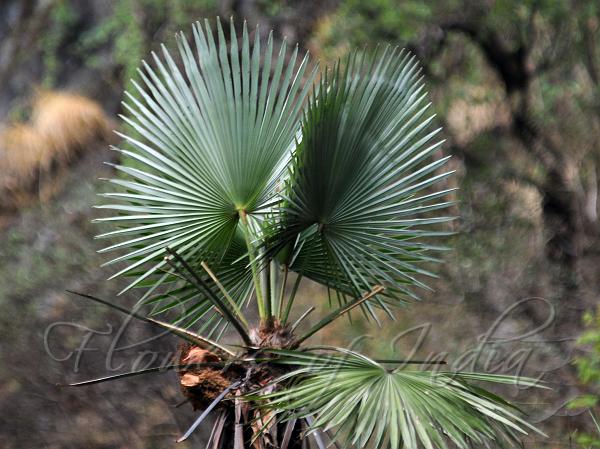|
| Kumaon Palm |
|

|

| File size | 735263 |
| Original date | 5/18/08 4:06 PM |
| Resolution | 2048 x 1536 |
| Flash | Flash did not fire |
| Focal length | 400.0mm |
| Exposure time | 1/320s |
| Aperture | 5.6 |
| Focus Distance | |
| Metering Mode | Spot |
| Camera make | NIKON CORPORATION |
| Camera model | NIKON D300 |
| Sensor type | OneChipColorArea |
|
|
|
|
Photo: |
Botanical name: Trachycarpus takil Family: Arecaceae (Palm family)
Kumaon Palm is a fan palm native to the foothills of the Himalaya in
Kumaon. It grows at altitudes of 1800-2700 m. The tree grows up to 10-15 m
tall, with a rough trunk covered in fiber from the old leaf bases. It is
easily distinguishable from Trachycarpus fortunei by the leaf blade being
irregularly divided only down to about the middle, among many other
features. It was first discovered by a Major Madden, a British Army
colonel with a passion for botany stationed in the Himalayas during the
1840s. Unfortunately, while Madden produced precise descriptions of both
the plant and location, he made the fatal mistake of assuming it to be
Trachycarpus martianus, failing to realize it was a separate species, thus
losing the chance to claim its discovery. First officially described by
the Italian Botanist Odoardo Beccari in 1905. The leaves all permanent,
with stalks about as long as the blade. Blade is 3/4 orbicular, 1-1.2 m in
diameter, irregularly divided down to about the middle into 45-50
segments, 60-85 cm in length. It is one of the cold hardiest palms to
produce a tall trunk, tolerating temperatures down to −14 °C.
During the flowering phase, 1–4 flowering spadices arise between the new
leaves and previous year’s leaves. Each spadix is 2-4 ft long, fleshy,
green, 3-5 times branched into ultimate panicles and covered by thick
spathe at each node. Basal spathe largest and upper gradually reduced to a
bract, densely covered by thick ferruginous velvety hairs on the outer
side, inner side smooth, lower spathe completely encircles the node.
Flowers are small, more of less regular, cyclic, arise on small expanded
base, in ultimate branches of panicles, in groups of 2-4.
Identification credit: Pankaj Kumar
| Photographed in Pithoragarh, Uttarakhand. |